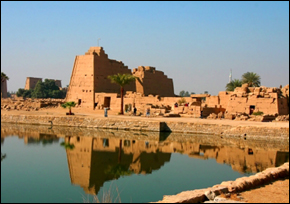Nile Basin Initiative Celebrates 10-year Anniversary
 Many joint economic development projects have been completed, but an agreement on cooperative management of the river basin has not been signed.
Many joint economic development projects have been completed, but an agreement on cooperative management of the river basin has not been signed.
Stakeholders in the Nile River Basin are meeting in Dar es Salaam, Tanzania this week to celebrate 10 years of the Nile Basin Initiative, but the elephant in the room will be the failure of member states to sign a treaty that governs the river’s waters.
The Nile Basin Initiative was founded to increase dialogue among the nine member states in order to cooperatively develop the river and share the benefits, according to the organization’s website. A cooperative framework agreement (CFA) was supposed to have already been signed that establishes a permanent commission to regulate the river. Disagreements over water allocation have stalled the treaty.
Contention is mainly between downstream Egypt and Sudan – which were allocated the entire Nile flow under colonial era treaties – against the rest of the upstream countries, which are demanding a more equitable distribution.
“It doesn’t matter if [upstream countries] are convinced. It matters that we are convinced,” said Egypt’s Water Minister Mohamed Nasreddin Allam to reporters this summer, according to Reuters.
Egypt, the most powerful country in the basin, is resisting any treaty that diminishes its share. Egypt contributes almost no water to the Nile, but views its reliance on the river as a matter of national security.
Roughly 85 percent of the Nile’s flow comes from Ethiopia, which would like to develop hydropower and irrigation projects to alleviate poverty and hunger.
An agreement was drafted at a meeting in May 2009, but Egypt and Sudan refused to sign it. Water ministers from the nine countries met again in July but postponed a decision on the CFA for six months.
The sticking point for the treaty is Article 14 (b), which addresses water security. Upstream countries want to keep the wording of the original CFA: “Nile basin states agree not to significantly affect the water security of any other Nile Basin state,” according to All Africa.com.
Egypt and Sudan want their historic rights protected and are arguing to include the clause “and current uses and rights.”
Despite the rancor over the CFA, the Nile Basin Initiative has substantially increased investment in the region. Over $1 billion in grants and loans has been spent on current and planned projects for hydroelectric power, data gathering, environmental protection and agriculture, according to Business Today Egypt.
The nine member countries are Burundi, Democratic Republic of Congo, Egypt, Ethiopia, Kenya, Rwanda, Sudan, Tanzania and Uganda. Eritrea is part of the Nile Basin, but not a member of the Initiative. Donors providing financial support include the World Bank, United Nations Development Program and the foreign aid agencies from 10 countries.
Ministers will meet again in February 2010 in Sharm El-Sheikh, Egypt to reconsider the CFA.
Source: Nile Basin Initiative, Reuters, All Africa.com
For a more in-depth look at the debate over the Nile River, go to Business Today Egypt.
Brett writes about agriculture, energy, infrastructure, and the politics and economics of water in the United States. He also writes the Federal Water Tap, Circle of Blue’s weekly digest of U.S. government water news. He is the winner of two Society of Environmental Journalists reporting awards, one of the top honors in American environmental journalism: first place for explanatory reporting for a series on septic system pollution in the United States(2016) and third place for beat reporting in a small market (2014). He received the Sierra Club’s Distinguished Service Award in 2018. Brett lives in Seattle, where he hikes the mountains and bakes pies. Contact Brett Walton










Leave a Reply
Want to join the discussion?Feel free to contribute!